The burden of being Wijeweera's widow
Twenty-six years after the JVP leader's arrest and
death, his wife speaks of the humiliation and hardships she and her six
children continued to undergo:
by Manjula Fernando
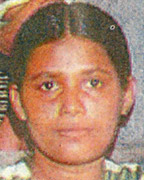 Chitranganee Srimathi, widow of JVP's iconic founder, Rohana
Wijeweera broke years of silence and let the spill gates open as it
were, when she wrote to President Maithripala Sirisena, Prime Minister
Ranil Wickremesinghe and Foreign Minister Mangala Samaraweera recently
about the plight of her children - now adults who are still suffering
the consequences of their father's rebellion. Chitranganee Srimathi, widow of JVP's iconic founder, Rohana
Wijeweera broke years of silence and let the spill gates open as it
were, when she wrote to President Maithripala Sirisena, Prime Minister
Ranil Wickremesinghe and Foreign Minister Mangala Samaraweera recently
about the plight of her children - now adults who are still suffering
the consequences of their father's rebellion.
"I had been silent for far too long and I have begun to wonder if I
did the right thing by my children," Chiranganee now 59 years said.
When the Sunday Observer contacted her last week, the story of the
widow of JVP founding leader, Rohana Wijeweera seeking state
facilitation to migrate had leaked and was making headlines in the media
including news websites.
By even Wednesday she had not received any response to her call. "I
am still waiting. I had to witness my husband being arrested and
murdered as a young wife, and raise six children as a single parent. And
today even those of my children who are educated have been denied a
decent living as they are branded as being Rohana Wijeweera's
offspring."
That is how, society remembers Rohana Wijeweera, if not, why are my
children still being deprived of a free life. Amidst the veneration and
remembrances on the surface, she asks. "My children were named, shamed,
humiliated, threatened and deprived."
Some of her children were bold enough to withstand all this but the
others are not that strong.
The eldest, the only one who has a faint memory of her father as an
eight year old then, is today separated from the family and is
undergoing psychiatric treatment. She was arrested in 2013 when she
tried to attack her mother and brother.
"She attempted suicide when she was 13 years. I asked for help from
the JVP leaders at the time and others, to send her overseas, to be away
form all this, to ensure that her emotional state will be intact.
Everyone I spoke to, turned me away. "
Arrest and surrender
Chitranganee surrendered to the State in 1989, after Rohana Wijeweera
was hunted down and arrested by the Army. It was announced the next day
that he was killed in a shoot out. She knew he was murdered by his
captors.
A public announcement via the State media called her to surrender
with a promise that the State would take the responsibility for her and
her six children. No one at the time wanted to shelter them, for fear of
earning the wrath of the state. At the time all pro-JVP elements were
being hunted and killed. Chitranganee said, she does not want to be a
puppet any longer. "I don't believe in the JVP anymore, I am grateful
for the small mercies they have given me so far but my children deserve
more. I was asked to keep mum and I obeyed without a murmur. No one
heard from me until now. But my children cannot pay for crimes that they
were never part of, when the people who were actually part of it lead
free lives today. So I decided to break the silence."
Chitranganee denied contacting the media .She had written to the
Government in March this year after receiving a letter in February to
vacate her house in the camp by October 1. The media got wind of it, by
which time she was ready to break the silence.
"I sometimes wonder if the JVP want my children to be sidelined and
cornered in this manner, Are they afraid that his children might claim
their right in the party?"
She said life was a constant struggle and that she was tired of it
now. "I don't want to keep anything secret, so that others will benefit
from my silence." Her letter was to the heads of state were due to the
mistreatment meted out to her. Soon the media pounced on the information
and followed it up.
"I have no faith in the people who lead the movement or the party
that my husband founded long ago. We have been cheated by everyone."
When my pleas to the JVP, who I thought could lend us a hand were
futile, I turned to leaders of the breakaway Peratugami Party. They did
not help us either. Chitranganee said she did not want to tarnish
anyone's image but was merely presenting facts. "I am the last person to
speak about these things in public if I had any other option. I have
been pushed to the brink with a notice from the Navy that I have to
vacate the house at theWelisara camp which we had occupied for many
years. We have nowhere to go."
Children's future
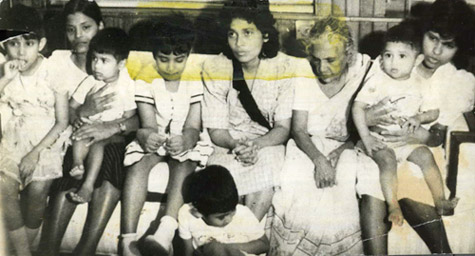 Chitranganee is torn between her desire to secure her children's
future and to keep silent about how her family was treated by the JVP
and even successive governments. Chitranganee is torn between her desire to secure her children's
future and to keep silent about how her family was treated by the JVP
and even successive governments.
This is not the first time she had been asked to vacate since the
late 1990s, when they first came into occupation. In 2008 also she was
asked to vacate.
As reluctant as she sounded, Chitranganee was not ready to hide her
anger, but wanted to guard certain information such as details of her
family, the child who is undergoing therapy, her relationship with the
JVP and most of all the identity of her children. She refused to give
recent photograph's of her children and pleaded not to publish their
names.
"My children have suffered enough, they have been branded as children
of a murderer." Out of the six children (four daughters and two younger
sons), two daughters and a son have completed university education, the
third daughter has studied up to postgraduate level but none are
employed. Her eldest is 34 years and the others are 33, 31, 28, 27 and
26 years. The youngest was not even born when her father was killed in
1989. Most of their childhood was spent at the Navy camp in Trincomalee
(till 1999).
"There were times when they came home from school or university
sobbing, after being verbally abused for a past that they were too young
even to remember, let alone be held responsible. I have tried to console
my children as much as I can, while a few of them withstood the stigma
associated with their father's violent legacy, some were not so brave.
Reaching out
In the letter to the President she had asked for state assistance to
migrate to the UK. From day one of her surrender, she had sought help to
leave the country, as she feared her children will not be accepted in
society here. She wanted to shield them from hatred, as the JVP was
partly responsible for the state sponsored terror that reigned the
country at the time.
"Many JVP members fled but I was held under detention. She now
regrets her decision to hand her self and family in."
"Wijeweera never discussed politics in my presence, although we were
in hiding since 1983, just three years into our marriage, we never
discussed what I should do in case he was caught."
He had made it a point to relegate his wife and children into a room
when party members came to see him.
"It was never discussed that I should take shelter in a foreign
mission. If I was advised better, our fate would have been much
different."
Chitrangnee has been given six more months to occupy the house at the
Welisara camp with the intervention of President Maithripala Sirisena
and after that she must find her own abode with her five grown up kids.
JVP has done a lot for them - JVP Leader Anura Kumara Dissanayake
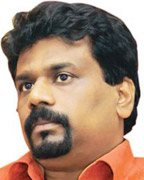 If the widow of JVP leader, Chithranganie Wijeweera didn't have any
source of income over the past 26 years, how did she survive ? Who
provided the opportunity for her children to pursue a good education?
The JVP has done a lot for them. One thing is pretty certain that we
didn't offer cheques to her to attract media publicity. We have
fulfilled our responsibility. She has said that she is not satisfied
with what we have done for the family. If the widow of JVP leader, Chithranganie Wijeweera didn't have any
source of income over the past 26 years, how did she survive ? Who
provided the opportunity for her children to pursue a good education?
The JVP has done a lot for them. One thing is pretty certain that we
didn't offer cheques to her to attract media publicity. We have
fulfilled our responsibility. She has said that she is not satisfied
with what we have done for the family.
Of course, she is entitled to make any statement she likes. Our party
has done the best it could to help them.
Anybody with a sense of proportion will concede the assistance given
by us for the children to have a good education to seek gainful
employment. Now that she complains about her grievances, the question
remains as to how she and her family lived during the last 26 years. Of
course, it is the government's responsibility to release them from their
custody. But she has never requested us to intervene to release them. We
can't ensure her security and that of her children. We can look into
their other needs.
They had a problem regarding their security and as such we also felt
it is more appropriate for them to continue to live in the safe house,
which she agreed to. If she ever sought release from the safe house, we
would have certainly intervened to help her. By the way, the JVP
headquarters at Pelawatta had become the abode for most of her children.
No decisions about Ulapane house - Cabinet spokesman and Media
Minister Gayantha Karunatilleke
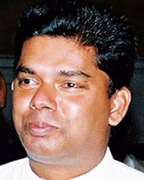 To my knowledge there has been no proposal to hand over the Ulapane
house which was occupied by Rohana Wijeweera to his family. The
Government has so far not discussed this matter at Cabinet level. To my knowledge there has been no proposal to hand over the Ulapane
house which was occupied by Rohana Wijeweera to his family. The
Government has so far not discussed this matter at Cabinet level.
If
there is a proposal and if the Government takes a decision at Cabinet
level, I may be in a better position to answer you.
We have looked after her Former JVP Leader Somawansa Amarasinghe
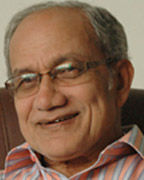 What she says is not true. The party has assisted them since 1994.
Before 1994 there was no way the party could help her family. We have
looked after her according to our capacity, even during my leadership.
On November 13, 1989, when Rohana Wijeweera was assassinated, the
government wanted his family to surrender to the security forces, they
said they will look after the family. It was not we who decided to keep
them in the Navy camp. Prime Minister Ranil Wickremesinghe was the
premier at that time. The Government is talking about the Tamils who
suffered during the war, the Sinhalese and Muslims were also victims and
they must be compensated. I have written to President Maithripala
Sirisena about Rohana Wijeweera's family. After the JVP was proscribed
in 1983, the Government confiscated our property. The family was living
in a house in Ulapane - that house belonged to the JVP, it was taken
over by the Government in 1989 and is being occupied by the Ministry of
Youth Affairs. What she says is not true. The party has assisted them since 1994.
Before 1994 there was no way the party could help her family. We have
looked after her according to our capacity, even during my leadership.
On November 13, 1989, when Rohana Wijeweera was assassinated, the
government wanted his family to surrender to the security forces, they
said they will look after the family. It was not we who decided to keep
them in the Navy camp. Prime Minister Ranil Wickremesinghe was the
premier at that time. The Government is talking about the Tamils who
suffered during the war, the Sinhalese and Muslims were also victims and
they must be compensated. I have written to President Maithripala
Sirisena about Rohana Wijeweera's family. After the JVP was proscribed
in 1983, the Government confiscated our property. The family was living
in a house in Ulapane - that house belonged to the JVP, it was taken
over by the Government in 1989 and is being occupied by the Ministry of
Youth Affairs.
They could give that house to them. If the family does not want to
live there, they can sell it and buy another house. We cannot rule out
that there is a risk to the family. |

